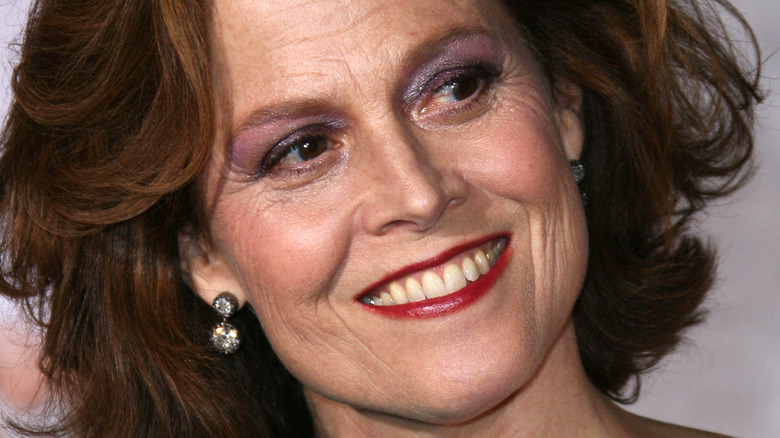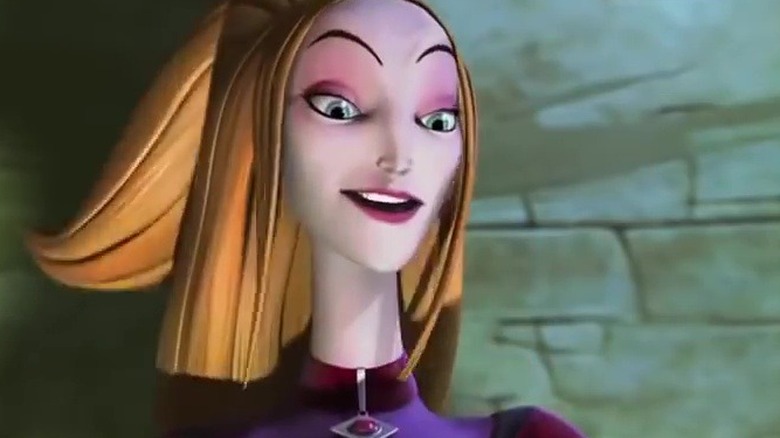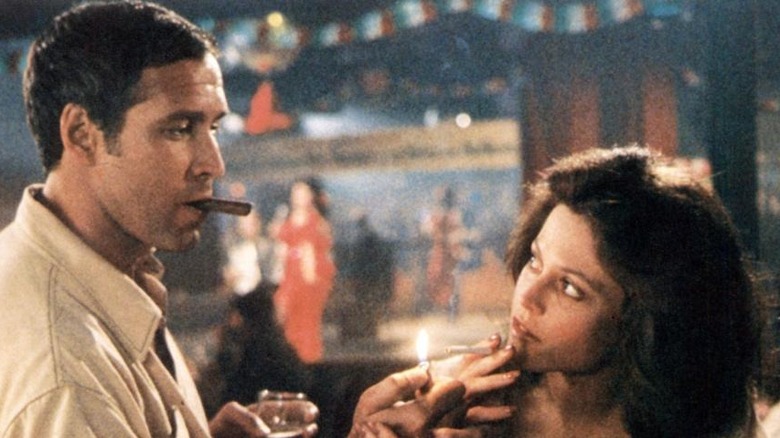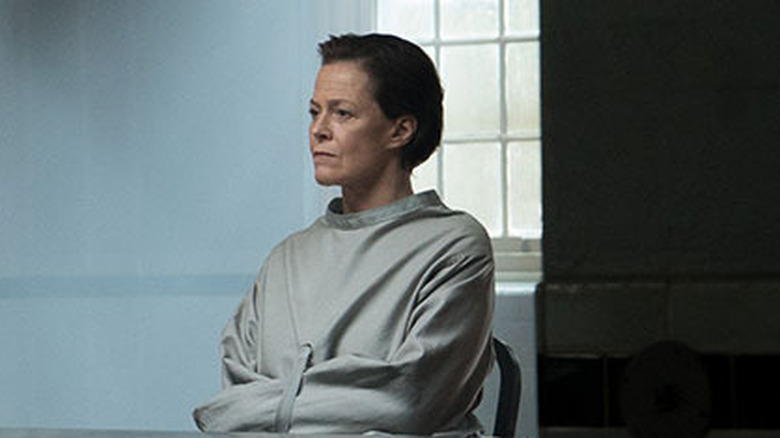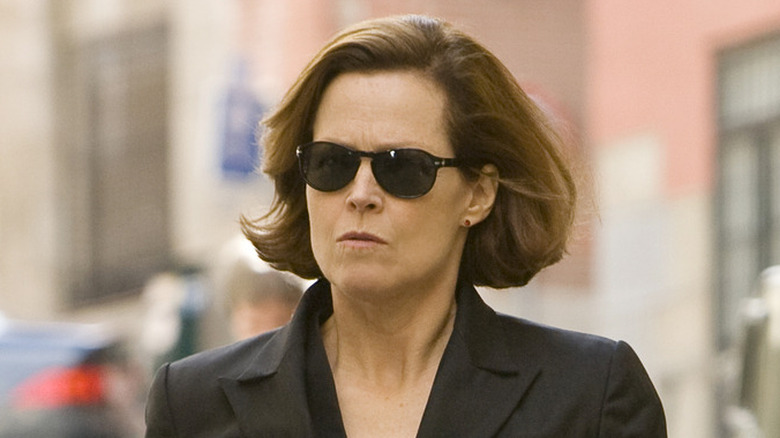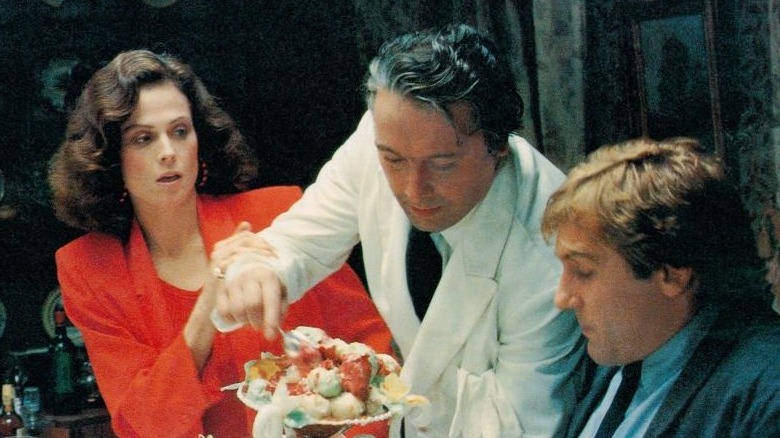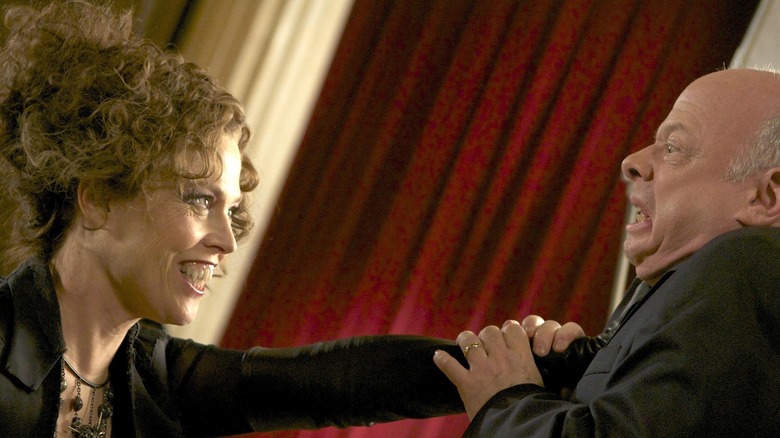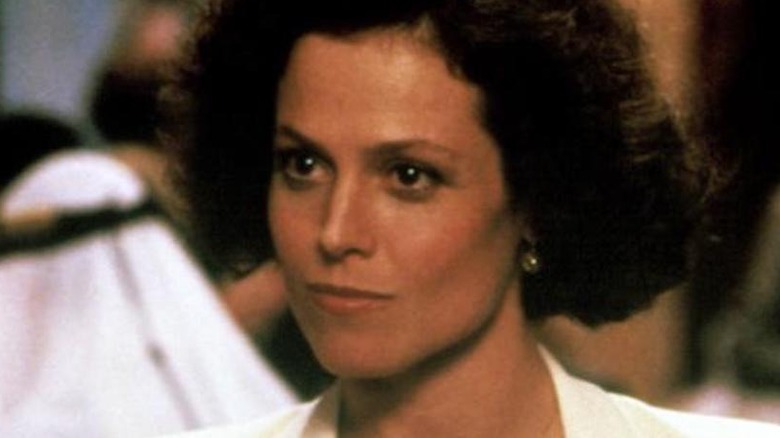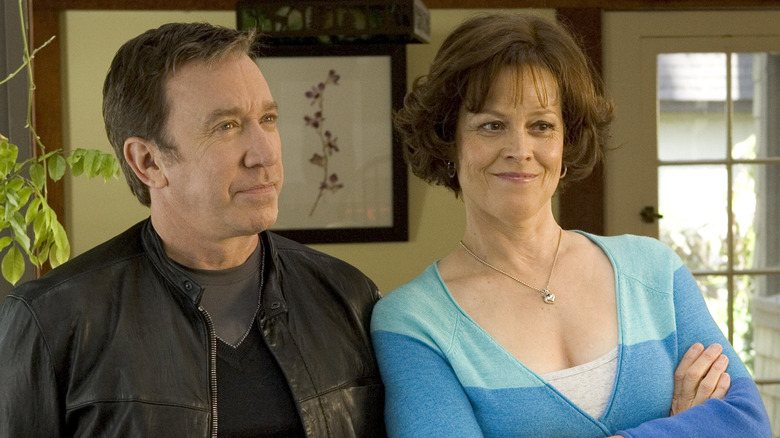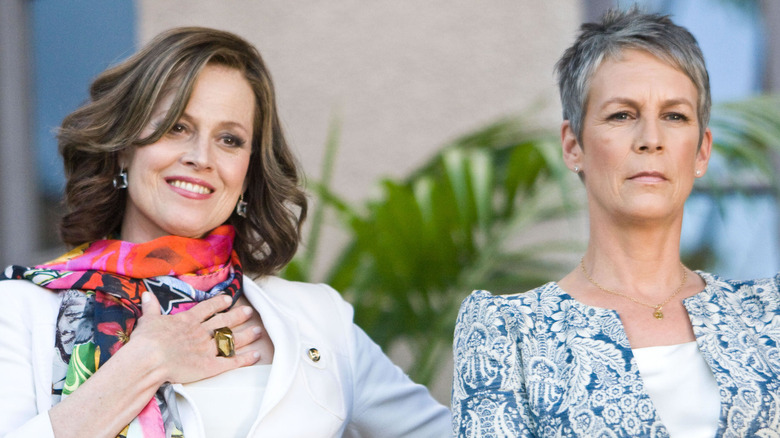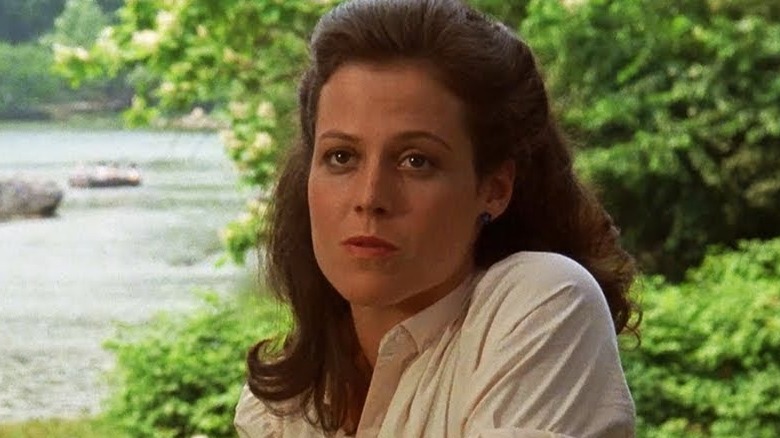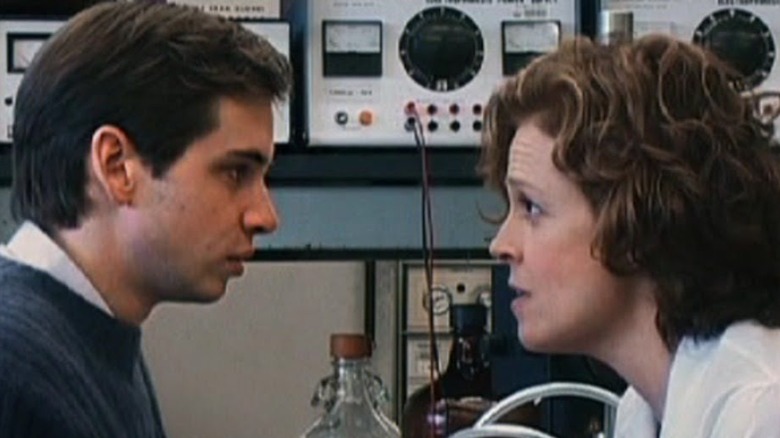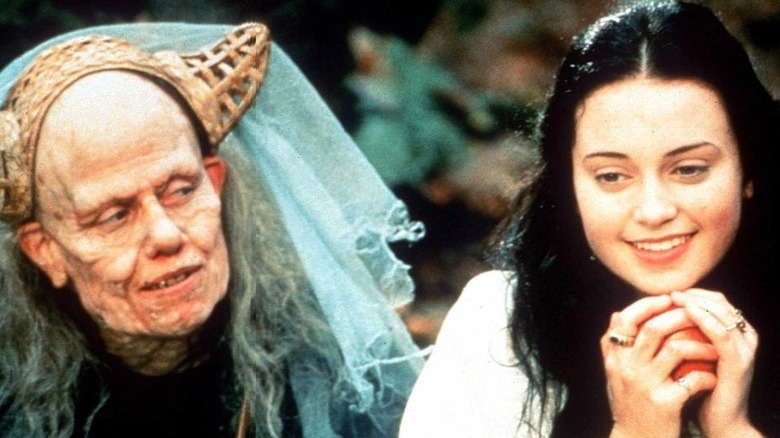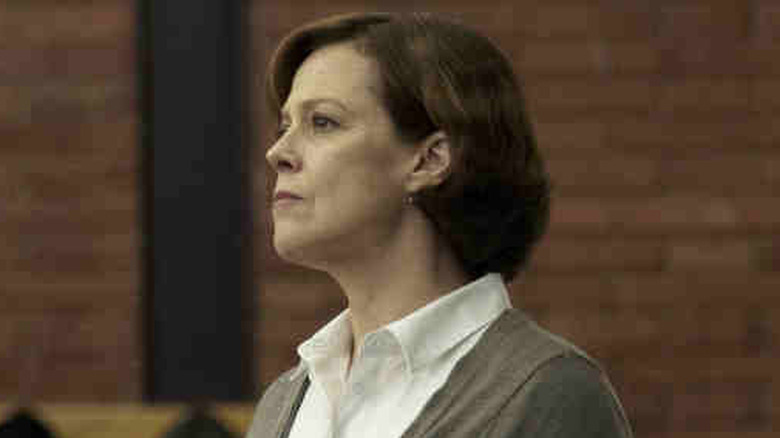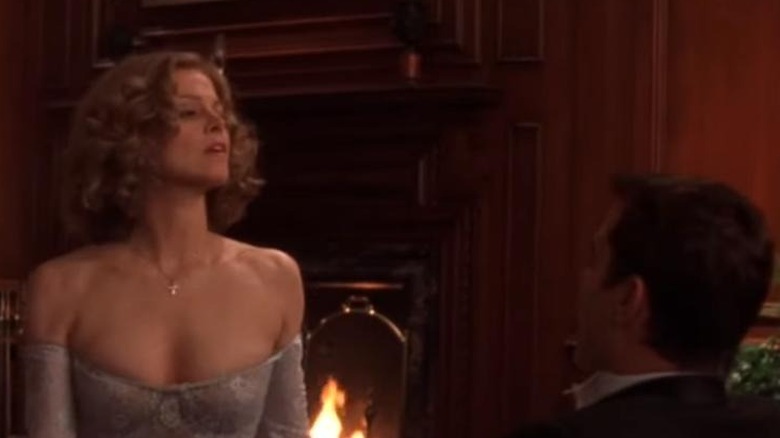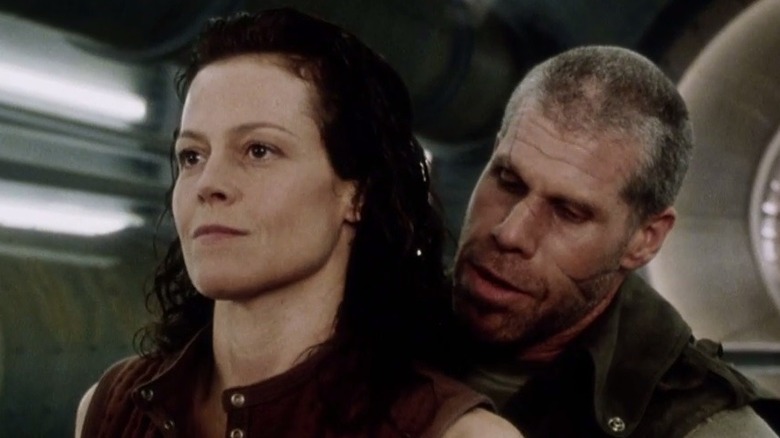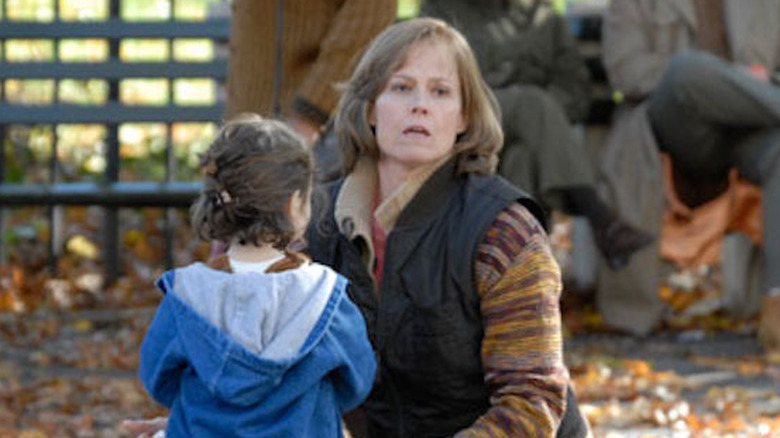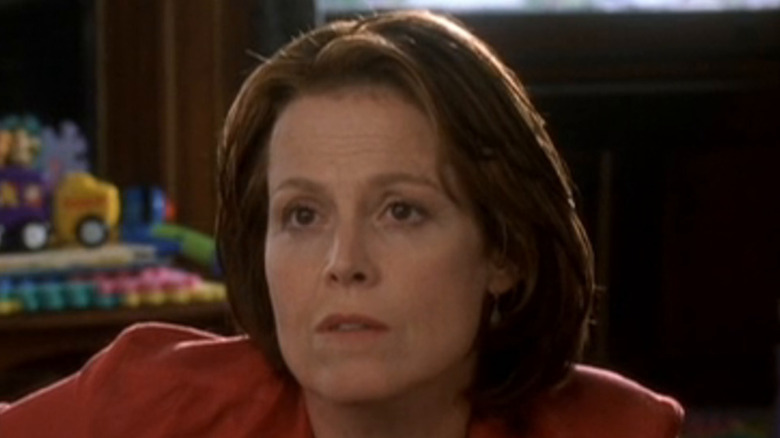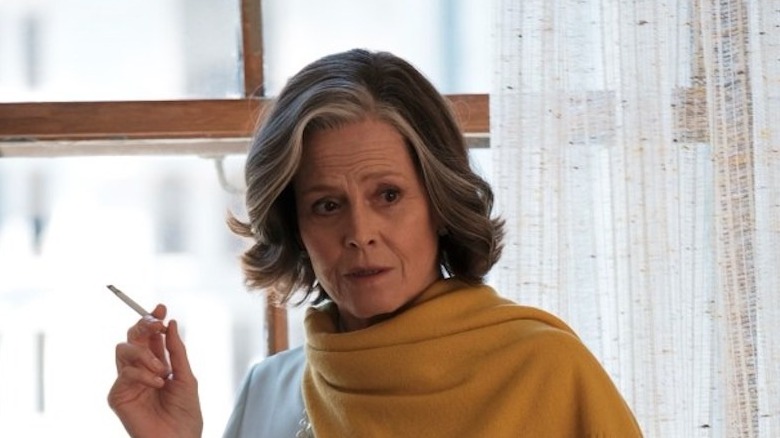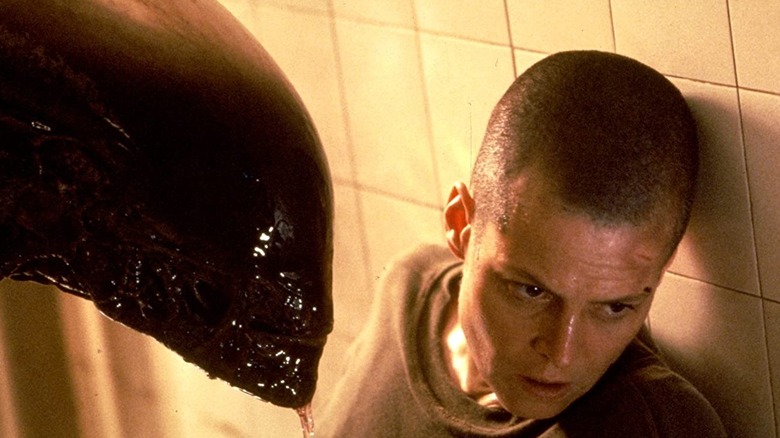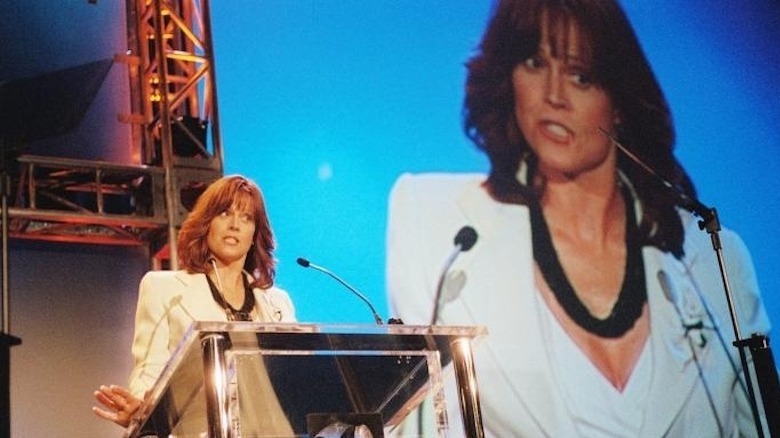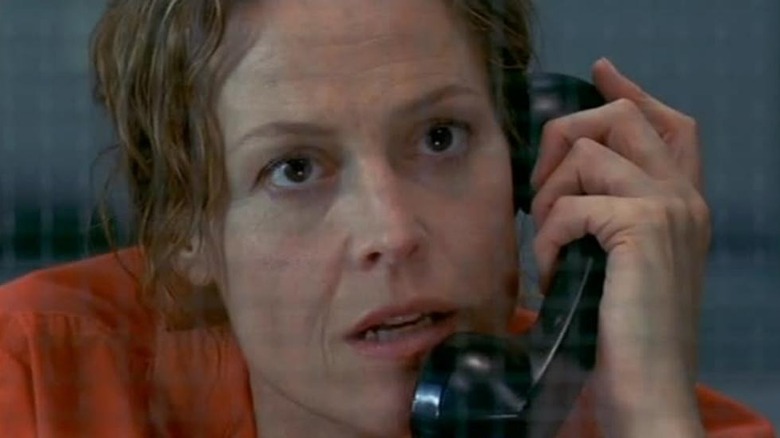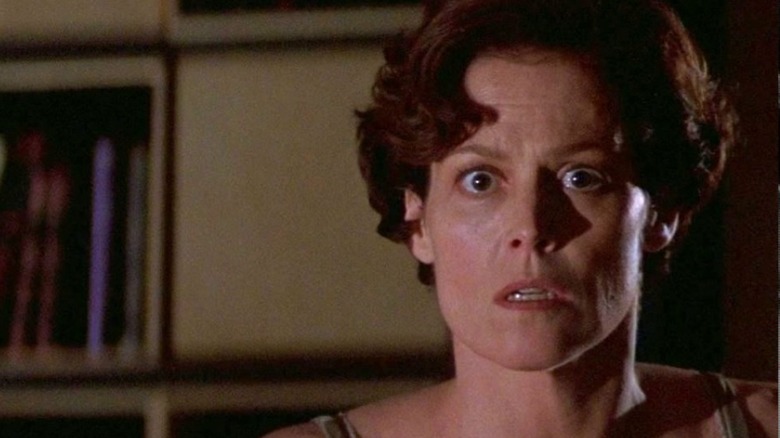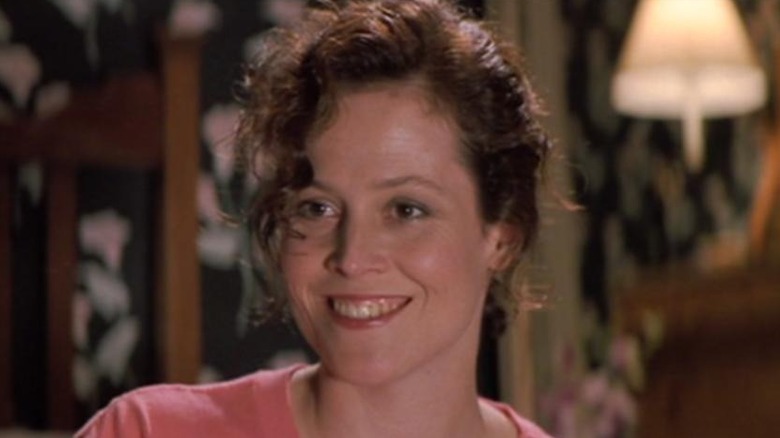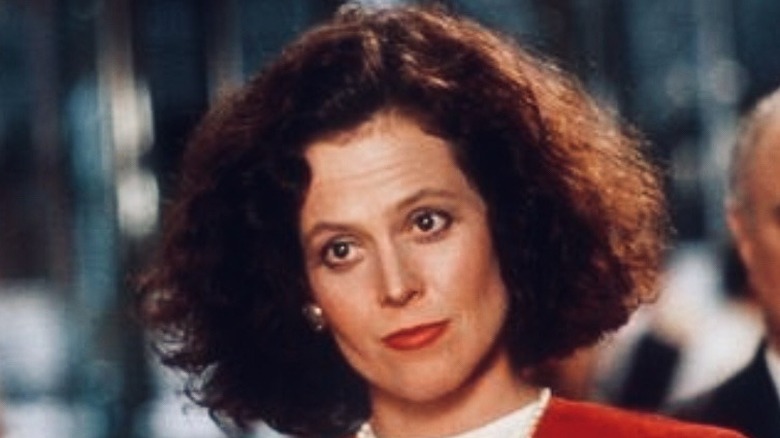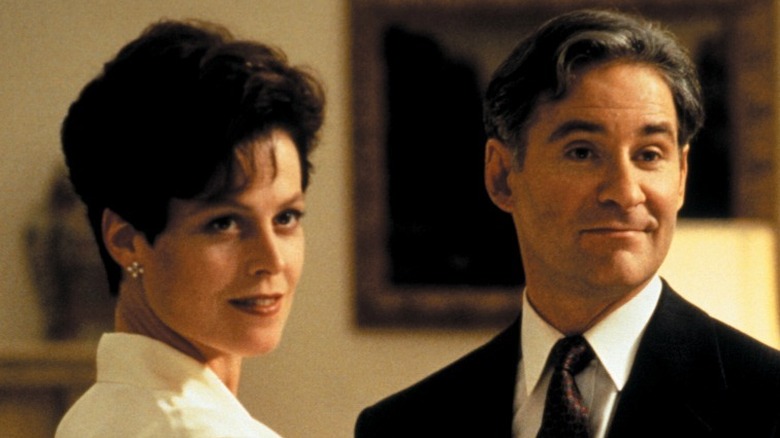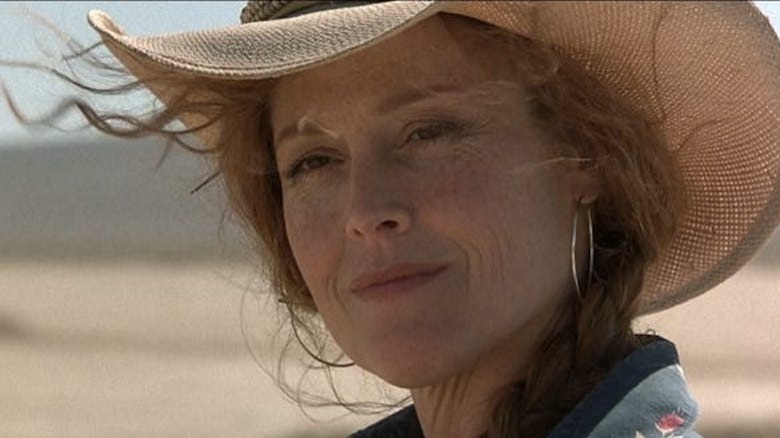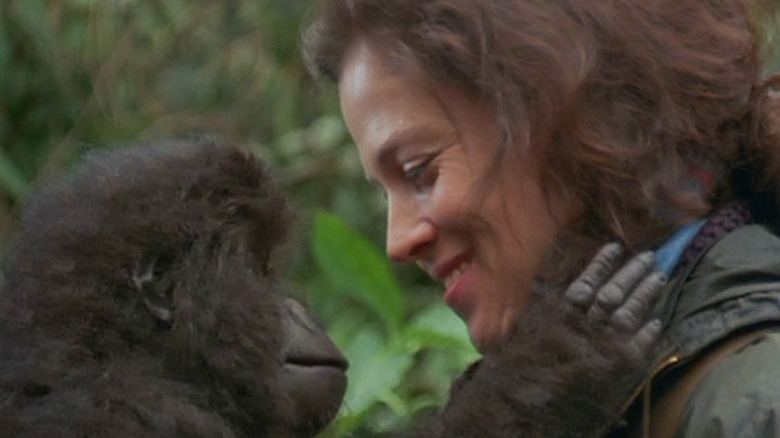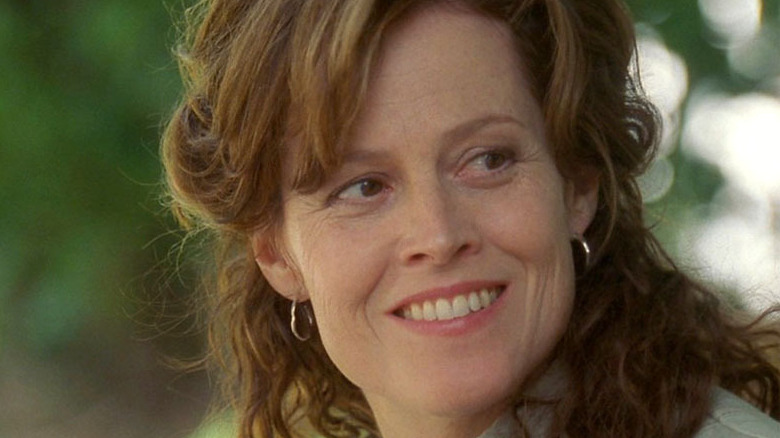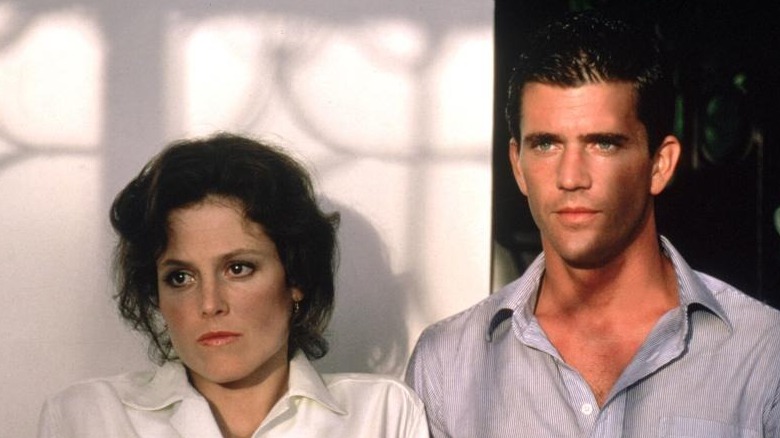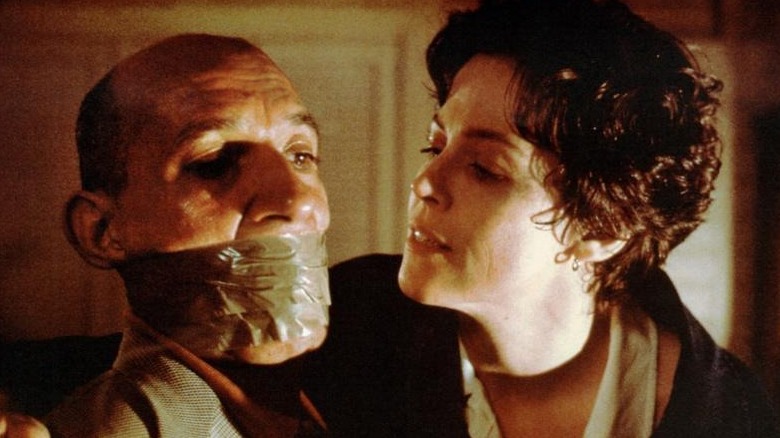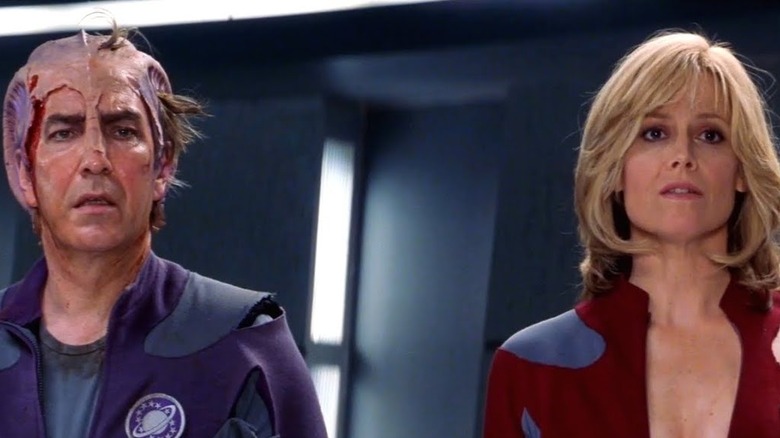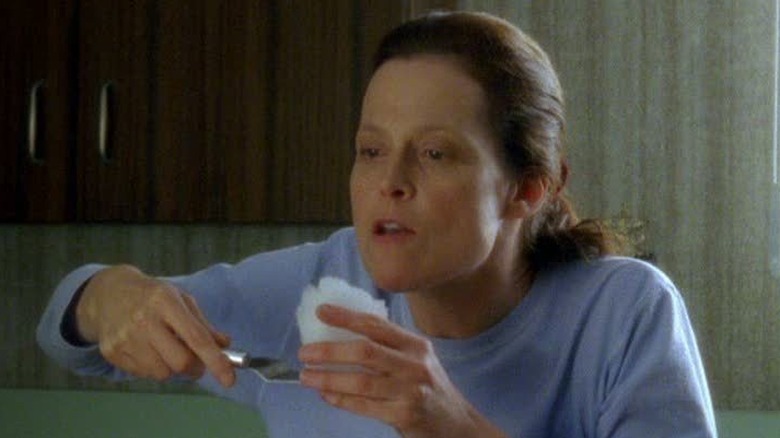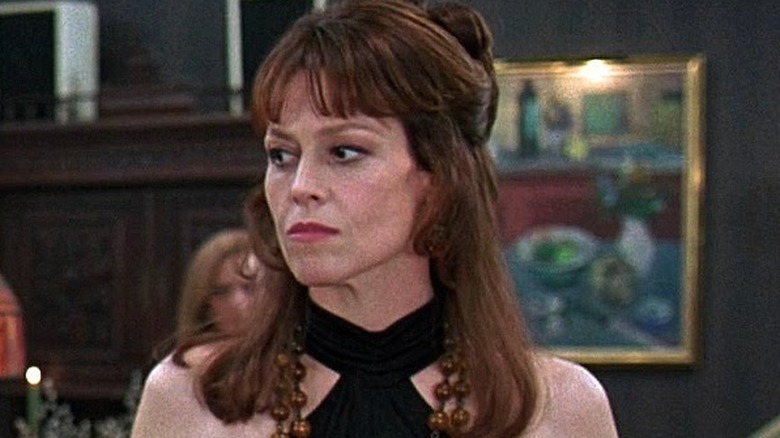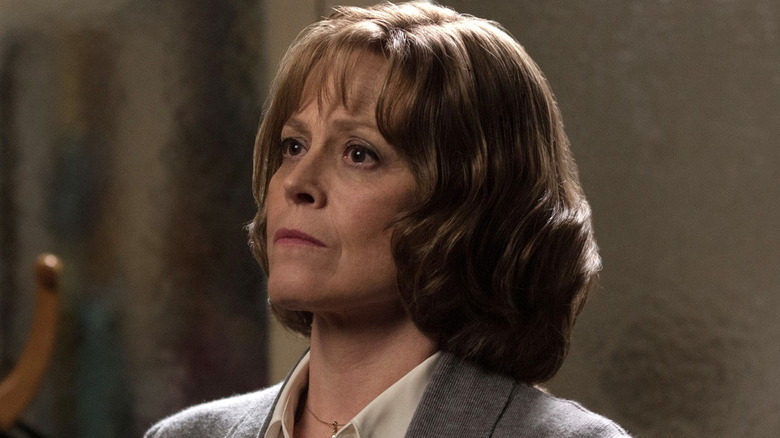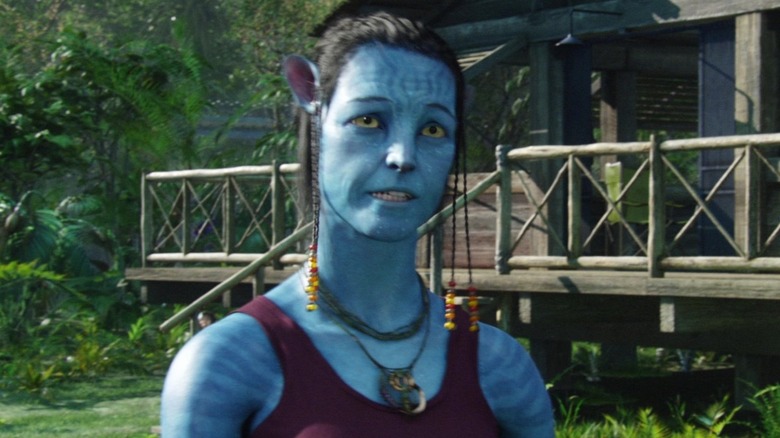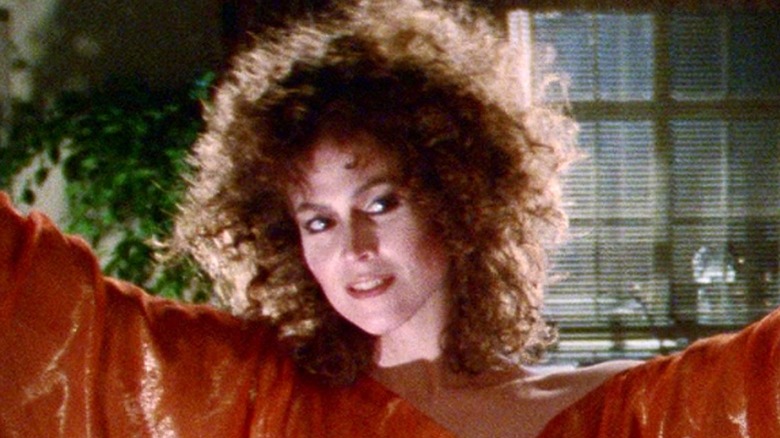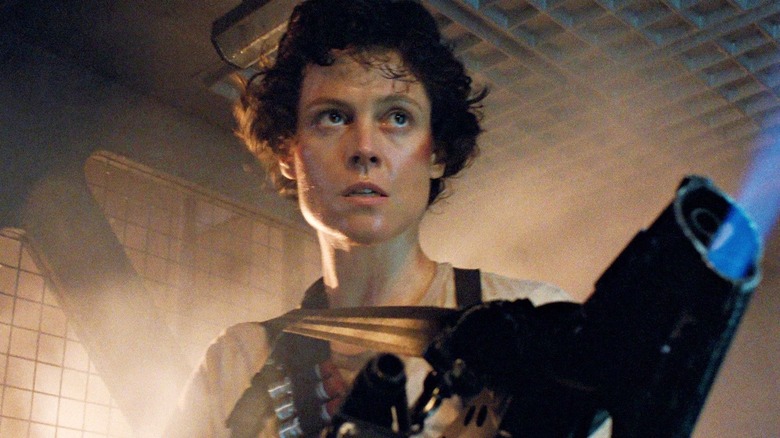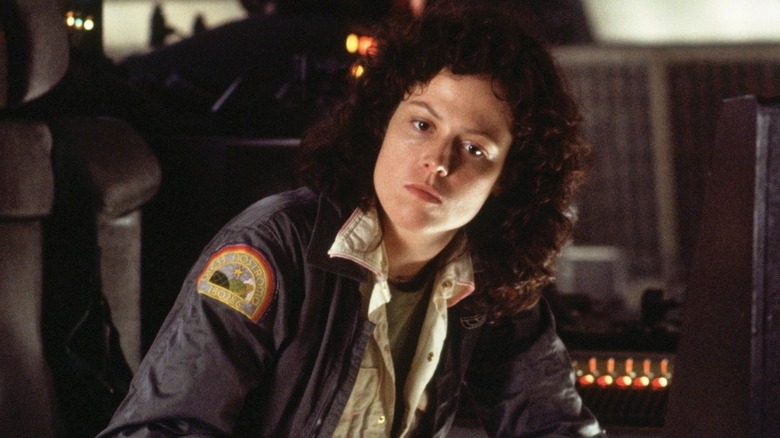Every Sigourney Weaver Movie Ranked Worst To Best
Ellen Ripley, Dana Barrett, Warden Louise Walker — at least three generations recognize these names even if they don't quite know who Sigourney Weaver is. There isn't a film or genre Weaver is afraid to tackle, so long as she likes the pitch. In those three character names alone you'll get a horror-sci-fi icon, a paranormal comedy, and a children's neo-Western movie.
Tall, funny, beautiful, talented — some would say she has the whole package. However, Weaver's full skillset wasn't always recognized. Before her breakthrough with "Alien," she attended Yale's drama MFA program, where her professors told her "you can only do comedy — don't ever try to do any drama" (via The New York Times).
By the '80s, however, Weaver was consistently landing gigs, two of them spawning iconic franchises. But make no mistake: in her prolific filmography — spanning over 60 films — Weaver had some real bombs as well.
Don't expect every one of those 60-plus films here either. Weaver was in "Annie Hall" for all of one scene with no dialogue; there's no need to touch on that in more than a sentence. Every other flick is a certified Weaver feature, organized by IMDb and Rotten Tomatoes rankings. So strap in, because as we count down the Sigourney Weaver list, nobody can hear you scream (with joy).
38. Happily N'Ever After
The first is the worst and this one is a real doozy. "Happily N'Ever After" gets it all wrong, starting with the title (Why is there an apostrophe? Why not simply "Never After," which communicates the same pun?). Panned by critics and audiences alike, the 2006 animated film was trying to cash in on the fairy tale revival started by "Shrek," but without any of the charm or good humor. With a star-studded cast for the time — including Sarah Michelle Gellar, Freddie Prinze Jr., and Weaver of course — this film followed the formula that has become all too common among animated films today by filling the cast with A-listers without a solid plot to back them up. Speaking of plot ...
Ella (Gellar) is a housemaid with a terrible stepmother, Frieda (Weaver). Sound familiar? The twist is that Frieda also has another servant, Rick (Prinze Jr.), who is friends with Ella while secretly being in love with her. Ella just wants to go to the ball and meet her Prince (Patrick Warburton), but trouble is afoot. The Wizard (George Carlin) who oversees all the fairy tales and ensures their happy endings goes on a vacation, and Frieda takes over his role as story warden to realize her own wicked desires.
Whether or not it ends happily ever after may not be worth finding out. As The New York Times had to say of the film in its review, "This is another tired kidsploitation product."
37. Deal of the Century
1983 was a big year for Chevy Chase. He was riding the success of his recent hits "Foul Play" and "Caddyshack," and he was about to release "National Lampoon's Vacation," forever cementing Clark Griswold in the cinematic canon of notable American fathers. Oh, and he also was in this one movie called "Deal of the Century."
Given Chase and Weaver's stardom, which was already apparent by '83, "Deal of the Century" is a somewhat surprising flop. Perhaps it can be explained by audiences growing weary with Chase's "patented what-can-you-do look," as Roger Ebert explained in his review of the film. Chase plays Eddie Muntz, a small arms dealer who gets caught up in a burgeoning conflict in South America. Muntz wants to play both sides, selling to the neurotic dictator as well as the insurgents. Along the way he meets an arms dealer with much bigger arms, Harold DeVoto (Wallace Shawn), who has a special missile called the Peacemaker. After DeVoto dies, Muntz acquires the missile in hopes of pawning it off himself. But DeVoto's widow, Catherine (Weaver), confronts Muntz to take back her dead husband's missile. The rest of the movie plays out with Muntz dancing around the various military factions interested in his missile, while Catherine remains a lingering presence.
While "Deal" wasn't the movie of the century, or even the year, Weaver's comedic breakout in "Ghostbusters" was imminent anyway. Just a year later, she would be moving onto bigger and better laughs.
36. The Assignment
"The Assignment" is the kind of movie that could only come from the cultural whirlwind of 2016, the Internet's purported worst year of all time. Alan Rickman and Prince died, Trump was elected president, and Sigourney Weaver starred in a thriller about a contract killer forcibly undergoing gender reassignment surgery. This is where the film's title comes from, after going through iterations like "Tomboy" and, unfortunately, "(Re) Assignment." 2015 was the "Year of Trans Visibility," according to Vogue, and it's truly a joy to see representation bloom and spread throughout the media. But as with any earthly bloom, there will be weeds.
Weaver stars as Dr. Rachel Jane, a plastic surgeon whose brother was murdered by a contract killer. As revenge, Dr. Jane manages to trap the killer, Frank Kitchen (Michelle Williams), and sedate him, and enact her revenge by giving Frank a nonconsensual reassignment surgery. Frank spends the rest of the film gunning down underworld members in order to find Dr. Jane.
More interesting than the movie itself is the expected controversy surrounding it. Members of the Trans community were understandably upset; GLAAD, an LGBTQIA non-profit, stated to the Hollywood Reporter, "We haven't read the script, but it's disappointing to see filmmakers turning what is a life-saving medical procedure for transgender people into a sensationalistic plot device." The film's director, Walter Hill, responded in Rolling Stone, saying, "There's nothing in the movie that doesn't agree with transgender politics or rights, at least in my admittedly limited understanding of them."
35. The Cold Light of Day
Although Weaver's breakout performance was playing the evasive hero Ripley in "Alien," she did not shy away from films that would cast her as the villain. "The Cold Light of Day" is one such movie, with Henry Cavill as the leading man. An altogether unremarkable movie that managed to earn $5 million more at the box office than was spent making it, "The Cold Light of Day" was a miss with critics and audiences despite its big-name cast.
This spy thriller begins with Will Shaw (Cavill), a consultant on the verge of losing his company, joining his family for vacation on a yacht in Spain. After leaving for supplies, Will returns to the boat to find his family missing, and the Spanish authorities offer little in the way of help. Will's father, Martin Shaw (Bruce Willis), arrives to help Will, revealing that he is a CIA agent. Their family has been kidnapped because of Martin's latest operation, and they will only be released in exchange for a MacGuffin briefcase. While attempting to retrieve the briefcase, Martin's CIA boss, Jean Carrack (Weaver), betrays him. Will must then contend with rogue agent Carrack to secure the briefcase and save his family — but sadly not the film.
34. One Woman or Two
Originally released in France as "Une Femme ou Deux," "One Woman or Two" sees Weaver showing off her range both as an actress and a linguist. In this romantic comedy, Weaver spoke a portion of her dialogue in French (if you can hear it under the translation in this video). It seems like the movie should be something of a success on that basis alone. However, the movie was actually something of a dud. Roger Ebert asked in the final paragraph of his review, "Is there any redeeming facet to this movie? Anything at all that makes it worth seeing?"
The core of the movie is a mix-up of two women: Jessica Fitzgerald (Weaver) and Mrs. Heffner (Dr. Ruth Westheimer). Archeologist Julien Chayssac (Gérard Depardieu) discovers the two-million-year-old skeleton of the first French woman, which he names Laura. Hoping to win a research grant for his discovery, Chayssac mistakes the American woman who was supposed to help him — Mrs. Heffner — with Jessica Fitzgerald, an advertising executive who hopes to use Laura for a perfume ad. Who ends up with Laura? Who ends up with the beau Chayssac? You'll have to tackle "One Woman or Two" yourself to find out.
33. Vamps
What makes a cult classic? Is it a certain number of uncanny lines? Is it a perplexing performance? Maybe it's just a vibe. "Vamps" is the kind of movie that could have been a cult classic if things had gone its way. It has the cast going for it: Alicia Silverstone, Krysten Ritter, Wallace Shawn (a co-star in a surprising number of Weaver films), and Weaver, playing a dark matriarch vampire. Another question: why do so many of her box office flops have Weaver playing the villain? Maybe she was born to play the heroine.
Here, though, Weaver plays Ciccerus, an ancient vampire who turns Goody (Silverstone) into a vampire in the 1800s and turns Stacy (Ritter) in the 1990s. Goody has grown forlorn during her time as a vampire, and though Stacy helps lift her spirits once she enters the scene, the two quickly become fed up with how difficult a vampire's love life can be. These two are the "Twilight" variety of vampires, who subsist off animal blood instead of human — rats in this case. The two discover that by killing the vampire who turned them, their humanity can be restored. With the help of Dr. Van Helsing (Shawn), the two hunt Ciccerus for the sake of their mortal souls and their romantic prospects.
32. Half Moon Street
It's always exciting when a movie puts its own spin on its source material, and "Half Moon Street" is one such example. The film is based on the Paul Theroux novel "Doctor Slaughter," a gritty thriller of a novel. The 1986 film diverges, according to Roger Ebert's review, in its more nuanced portrayal of the two primary love interests, played by Weaver and Michael Caine. "I could not recall a single bad performance by either of the stars," Ebert said, and "Half Moon Street" was no exception. The broader critical response to the film was less kind; the film garnered a feeble 5.3 out of 10 on IMDb.
The film follows the bold Doctor Lauren Slaughter (Weaver), an American policy worker at a think tank in London. Despite her doctorate, Dr. Slaughter struggles to pay the bills. After receiving a mysterious videotape, Slaughter decides to moonlight as an escort to make ends meet. And they more than meet: Slaughter ends up with a flat in Westminster's Half Moon Street, hence the title. During her nighttime work, Slaughter becomes involved with Lord Bulbeck (Caine), a member of the House of Lords. Lord Bulbeck is working to secure a peace treaty in the Middle East, and his budding romance with Slaughter gets tangled up in the bureaucratic drama.
31. Crazy on the Outside
One would think that a movie with Ray Liotta, J.K. Simmons, Kelsey Grammer, and Sigourney Weaver could make any movie a hit, no matter the script. However, as the Hollywood Reporter said during its 2010 premiere, "Crazy on the Outside" falls flat despite its towering cast. The film — which starred Tim Allen and was his directorial debut — couldn't seem to find its footing, "veer[ing] between sensitive drama ... and farcical humor."
Allen plays Tommy Zelda, a recently released convict who was locked up for pirating movies (seriously). Back in the outside world, Tommy hopes for a new start, but things go wrong out of the gate thanks to his sister Viki (Weaver), a compulsive liar who told the family that Tommy was off in France rather than serving time. Tommy tries to maintain the lie with his family while balancing the demands of Angela (Jeanne Tripplehorn), his strict parole officer. Along the way, Tommy's former partner in crime Gray (Liotta) shows up and tries to cajole Tommy back into illegal activity. Between his oddball sister, his new romance with his parole officer, and the call of his past life, the question lingers: will Tommy stay straight? With Viki's help, he just might. Do you care? That's debatable.
30. You Again
"You Again" is a 2010 comedy with an interesting premise and strong cast that falls victim to poor execution. Its pitch is simple: remember the high school bully you couldn't escape? She's marrying your older brother. With that starting place, plus Jamie Lee Curtis, Sigourney Weaver, Kristen Bell, and Betty White, it's hard to believe this film was reviewed so negatively. The problems with the film are best summarized by the Hall of Shame award it won at the Women Film Critics Circle Awards in 2010, bestowed on the movie for its "perpetuation of the same-old same-old stereotypes of hysterical insecure women and reasonable, sage men." Despite the critical misgivings, "You Again" still managed a decent performance at the box office, earning $32 million to its $20 million budget.
The plot proceeds from the aforementioned premise, where Marni (Bell) learns her brother is marrying Joanna (Odette Yustman), her former bully. Joanna feigns ignorance when Marni arrives home, in order to keep her fiancé unaware of the bad blood. Meanwhile, Marni's mother Gail (Curtis) learns that Joanna's aunt Ramona (Weaver), who had been her friend in high school, is coming to the wedding. Mirroring the younger women's rivalry, Gail and Ramona also dredge up old beef. As the wedding approaches, Marni quarrels with Joanna while Gail fights Ramona, and the union of these two families becomes more and more uncertain.
29. Eyewitness
"Eyewitness" may be the first good movie on the worse side of this list, at least if you ask the critics. On Rotten Tomatoes, the film sits pretty at a 75% score with the critics and a homelier 38% with audiences. When it premiered in '81, The New York Times praised the "high spirits and ... no-nonsense intelligence" of the movie, and many were fans of the "Breaking Away" director-screenwriter combination of Peter Yates and Steve Tesich. The Times reviewer was sensitive to the fact that "Eyewitness" wouldn't play well for audiences, noting that it might "send some people out of the theater with murder in their hearts."
As this same review notes, there are two main plotlines intertwining in the film. On the one hand there's Darryl Deever (William Hurt), a Manhattan janitor who is something of an oaf. On the other, there's an Israeli intelligence operative, Joseph (Christopher Plummer). The overlap of these threads is Toni Sokolow (Weaver), a TV reporter engaged to Joseph. Darryl has a crush on Toni that borders on obsession, and when a murder occurs at his job, he gets close to Toni by letting on that he knows more about it than he actually does. The plot is a bit harder to follow from there, but according to the Times, "Logic doesn't score in 'Eyewitness,' but intelligence and feelings do."
28. Tadpole
Pop culture is obsessed with the many-hued allure of the stepmother. Cinderella's stepmother is dark and evocative of fear; Claire in the show "Fleabag" stirs up a strange obsession in her stepson, whose dialogue consists almost entirely of the phrase "Where's Claire?" "Tadpole" finds its roots in this same cultural preoccupation — the woman who comes in suddenly and becomes your mother.
Oscar Grubman (Aaron Stanford) is an intellectually precocious yet romantically underdeveloped teen of 15. He cares about libraries, not ladies — not the ones that are his age, anyway. No, Oscar's affections are for his stepmother Eve (played by Weaver). Eve is ignorant to his affections, or ignores them, but her colleague Diane (Bebe Neuwirth) becomes enamored with the bright boy. Wearing Eve's scarf, Diane seduces Oscar, and he spends the remainder of the movie trying to keep Eve and his father from discovering the affair.
"Tadpole" was generally favored by critics, less so by audiences, according to Rotten Tomatoes. Roger Ebert in his review pointed out where the discrepancy may lie. "Too much has happened in the arena of sexual politics since 'The Graduate,'" he said, and audiences didn't take as kindly to the Oscar-Diane romance. It probably didn't help that "Oscar was 15 and his stepmother and her friend were about 40."
27. Snow White: A Tale of Terror
Another Sigourney Weaver stepmother movie, and the first of two where she played the evil stepmother from a fairy tale. Whereas in "Happily N'Ever After" she tormented Cinderella, here she plays a somehow more twisted version of Snow White's evil stepmother. "Snow White: A Tale of Terror" follows the trend of the last 20-odd years of rebooting perfectly good movies in grittier terms. The 1997 film is essentially a "Snow White and the Huntsman" precursor. While the plot takes some interesting diversions from the usual Snow White formula, the film, and Weaver's "complex" portrayal of the evil stepmother, "is undone by an abundance of gargoyles and gore," according to a Variety review.
Where the prototypical Snow White is kind and blameless for her treatment at the hands of the stepmother-slash-witch, Lilli, as she is known in this film, is a petulant stepdaughter played by Monica Keena. Claudia (Weaver) is the noblewoman who replaces Lilli's mother, who died giving birth to Lilli in a horrible accident. Despite the kindness Claudia shows to Lilli, the girl never warms to her, even openly defying her at a ball. Lilli's vitriol toward her stepmother causes Claudia to miscarry her child, which sends her spiraling into becoming the evil witch the tale demands her to be. From there, the narrative follows the familiar path seen a dozen times before, with some unique spins that didn't amount to enough for audiences and critics alike, but earned Weaver an Emmy nomination.
26. Red Lights
Movies like "Red Lights" do an important job in cinema. Films like these, the perfectly mediocre kind, are made to be put on during sick days, lazy Sundays, and in the background at parties and dates. It is necessary that they have stellar casts to bolster the often below-average scripts. All the better if it's a thriller. "Red Lights" — a 2012 supernatural flick that came out at the tail-end of the "Paranormal Activity" series craze — checks all these boxes.
Weaver plays Margaret Matheson, a psychologist and paranormal skeptic who is out to discredit Simon Silver (Robert De Niro), a famous psychic. Helping Matheson is her assistant Tom Buckley (Cillian Murphy). Despite her persistence, Matheson is unable to disillusion the public about Silver. After a tragic accident befalls Matheson, Buckley is left to take on Silver on his own, and he is overtaken by the obsession like Matheson before him.
25. Heartbreakers
"Heartbreakers" centers on the Conners, a mother-daughter team who make their dishonest dollar by conning (Conners conning ... sigh) rich men out of their money. They have a routine. Max, the mother (Weaver), convinces older men to marry her, and on the night of their wedding, Page, the daughter (Jennifer Love Hewitt), convinces the men to sleep with her instead. But before any Conner has consummated anything, Max busts in and divorces her newlywed husband, splitting the divorce settlement with her daughter. All's going well, but Page wants out. Unfortunately, the pair learn that the IRS has caught on to them and seized their money. In order to recoup their losses, they agree to one last con before splitting up. Ray Liotta plays Dean, a man who lingers despite being deceived by one of Max and Page's cons.
Another day, another Sigourney Weaver movie alongside Ray Liotta. This one, like many in this early-middle section of the list, received mixed critical appraisal, some positive and some not so much. Roger Ebert "like[d] its spirit," and the New York Times praised Weaver's "underappreciated gift for comedy."
24. Alien Resurrection
Of all the movies in the Alien franchise – arguably the most important series Weaver has ever been involved with — 1997's "Alien Resurrection" is probably the worst, by a slim margin. The movie had almost everything going for it: the brand name, Weaver starring, Winona Ryder co-starring, and Joss Whedon penning the screenplay. But despite the good components, something didn't click. "They said the lines ... wrong," Whedon said of the final product (per Digital Spy), along with many other poor decisions — in Whedon's view — made by the filmmakers.
Set 200 years after the events of "Alien 3," "Resurrection" stars a clone of the old heroine Ellen Ripley (Weaver), who has been reconstructed to aid in the breeding of xenomorphs, the eponymous alien of the series. Breeding alien killing machines, of course, goes quickly wrong. The xenomorphs escape their confinement, and due to an emergency protocol, the spaceship they are on heads back to Earth. It becomes a race against the clock. With the help of Annalee Call, an android played by Winona Ryder, and some mercenaries (including Ron Perlman), Ripley just might pull it off.
"Alien Resurrection" did not do well at the box office. That and the poor critical reception didn't deter Weaver, who expressed her excitement for the idea of an ending to Ripley's story at San Diego Comic-Con back in 2016 (per Entertainment Weekly).
23. The Girl in the Park
One of the best things about Sigourney Weaver is that she'll take just about any role, if she finds it interesting enough. These stories are never flat or plain: there's always some catch that draws this unique performer to her roles.
The hook of 2007's "The Girl in the Park" is that a mother, Julia (Weaver), loses her young daughter at a park in New York City, and the girl is never found. Some 16 years later, Julia has estranged herself emotionally from the people in her life — her husband and son — and switched from a career as a jazz singer to a bank worker. She is pulled out of her slump, though, when she meets Louise (Kate Bosworth), a woman who Julia begins to believe may be the daughter that she lost all those years ago. From there, Julia begins to unravel, in a "memorable" performance by Weaver that The Guardian praised.
22. The Guys
Before Sigourney Weaver was one of cinema's most recognizable and prolific actresses, she was a woman of the stage. Weaver actually attended Yale's renowned drama MFA program, although she had "a difficult time" there "because they took everything so seriously" (per Observer). She starred in some stage productions, particularly those of her friend Christopher Durang from Yale (per The New York Times), before shifting to film. She did not completely abandon the stage though, as can be seen in "The Guys," the film adaptation of a 2002 off-Broadway play. Weaver portrayed one of the leads both on stage and later on screen.
The premise of "The Guys" is simple but poignant. Nick (Anthony LaPaglia) is a New York Fire Department captain who lost eight of the men under his command during 9/11. He is preparing a eulogy for them. Joan (Weaver) is an editor who assists Nick with this task. Nick shares stories with Joan about each man, the titular guys, and she takes the pieces of these men and assembles the written eulogies for Nick. The film is a somber tribute to the first responders, and it was received well – thankfully — by audiences and critics alike.
21. My Salinger Year
Whereas in the previous movie Weaver played the writer, in "My Salinger Year" she portrays a literary agent whose agency represents J. D. Salinger, famous (or infamous) in sophomore English classes across the country for writing "The Catcher in the Rye." The film was based on a memoir of the same name by Joanna Rakoff.
Joanna (Margaret Qualley) is a fresh Berkley graduate who takes a job in New York City working at a prestigious literary agency. Joanna aspires to become a writer, and prior to taking the agency job, she had no idea Salinger was its big client. In fact, she didn't even know who Salinger was. Joanna works for Margaret (Weaver), a stern veteran agent who scoffs at Joanna's writerly daydreaming. Despite the title, Salinger is not a primary character of the film so much as an enigmatic background force that propels Joanna's curiosity and passion. An reviewer for RogerEbert.com praised Weaver's "minor-key but affecting performance," and likened the dynamic between her and Qualley to that of Anne Hathaway and Meryl Streep in "The Devil Wears Prada."
20. Alien 3
There's a nice balance to the "Alien" franchise: there's the two mediocre ones, and there's the two incredible ones (only counting the films with Sigourney Weaver, of course). Fortunately, "Alien 3" is the better of the lesser entries. Its mediocrity can be attributed in large part to the production of the film, at least according to a Vox article detailing the tumultuous process from pre-production through editing. The film went through several different ideas, scripts, and directors before landing in David Fincher's lap. This was Fincher's first feature film, and "his on-set perfectionism grated on the producers." The friction between him and the studio lasted through editing, and the final product had cut much of Fincher's intended vision.
"Alien 3" tells the final chapter of Ripley's story (at least the original Ripley). Directly following the events of "Aliens," Ripley is the sole survivor of a crash landing on an all-male prison colony. It soon becomes clear, however, that an alien in its early form had crashed with Ripley but escaped into the colony. Teaming up with some of the less-troubled inmates — a doctor named Clemens (Charles Dance) and the inmates' leader, Leonard (Charles S. Dutton) — Ripley resolves to exterminate all the aliens on the colony, no matter the cost.
Fans of the franchise will be pleased to know that, much like the Snyder cut of "Justice League," there is an extended version of "Aliens 3" that the same Vox article attests holds truer to Fincher's original vision; but unlike Snyder, he had no part in its creation.
19. The TV Set
Sigourney Weaver has done it all: drama, psychological thriller, explosive James Cameron action, you name it. Her most iconic roles, though, are arguably her performances in horror ("Alien") and comedy ("Ghostbusters"). So when Rolling Stone says that her performance in "The TV Set" is "scarily hilarious," combining the best of both genres, you know you're in for a treat.
David Duchovny leads as Mike Klein, a screenwriter trying to get his TV series through the various hurdles of production. Weaver plays Lenny, the president of the network airing Mike's show. Lenny is more concerned with viewership than pure art, and prevents Mike from realizing his vision exactly as he wants. Think of her as the Jack Donaghy to Mike Klein's Liz Lemon – although that might be oversimplifying things. As the Rolling Stone reviewer concluded about "The TV Set," "there's a lot more going on ... than first meets the eye."
18. A Map of the World
"A Map of the World" is difficult to pin down, which is surprising given the fact that it's based on a book of the same name. That means there are two versions of this story, and still audiences and critics alike aren't sure what to make of it. Look for a summary online and there's little in the way of explanation (Roger Ebert, in his review, deliberately chose to withhold the circumstances of the plot). On Rotten Tomatoes, the scores are mixed between a 66% approval by critics and 55% by audiences. With all the obfuscation and middling opinion surrounding the film, one can't help but wonder: why did this secure Weaver a 2000 Golden Globe nomination?
Maybe it was a quiet year, or perhaps Weaver outperformed a so-so script. Or maybe there's a hidden-gem quality to "A Map of the World," the tumultuous story of a Wisconsin mother, Alice (Weaver), put on trial for a tragedy that befalls a friend's child while under her care. The child's mother, Theresa (Julianne Moore), would be the maudlin center-of-attention in a worse film, but as The New York Times attested in its glowing review, this "is Ms. Weaver's movie, and she dominates virtually every scene." Give it a chance; per her Times profile, it's "the movie of hers that she most wishes more people had seen."
17. Copycat
"Copycat" is exactly the movie one would expect to see at the start of the dot-com bubble, in the era of "The Silence of the Lambs" and "Seven." It is, more or less, the story of an agoraphobic woman isolating in her high-tech apartment while also trying to help detectives catch a flashy serial killer. One might expect to see a film just like it set during the pandemic, only with a quarantining lead, rather than Weaver's subdued performance in this "limiting role" (per Roger Ebert).
Helen Hudson (Weaver) is an academic expert on serial killers, and she used to walk about the world just fine, until she is attacked by a serial killer after a lecture. After the traumatizing event, Hudson locks herself away in her home, with little direct contact with the outside world. That all changes once a new serial killer, who mimics the crime scenes of other famous killers (hence "Copycat") begins his killing spree. Hudson is recruited by detectives M.J. Monahan (Holly Hunter) and Reuben Goetz (Dermot Mulroney) to help crack the case with her expertise, and from there things come undone in the exciting fashion typical of a crime thriller.
Of note in this otherwise run-of-the-mill 1995 thriller is the discrepancy between the audience's judgment and critical appraisal — 64% versus 79% on Rotten Tomatoes, respectively. For Roger Ebert, it was Holly Hunter who stole the show and his heart. For The New York Times, the direction and "crackling good" screenplay elevated it above the mundane.
16. Ghostbusters 2
"Ghostbusters 2" begins five years after the original film, with the team having disbanded. Apparently wrangling ghosts wracks up a hefty bill of public damages, so the city has banned the group from their paranormal work. Dana (Weaver) has split up with Peter (Bill Murray) and now works at a museum curating ancient artifacts. At home, she watches over her son Oscar. It all goes awry when the spirit of an old dictator, locked in a museum artifact, bewitches Dana's boss and demands Oscar as a vessel for ghostly possession. In light of it all, there is only one group Dana knows to call.
As the "Ghostbusters" franchise keeps attempting to reboot — with 2016's lady-led "Ghostbusters" and the more recent "Ghostbusters: Afterlife" — it's interesting to look back on the entry that halted this titanic franchise in its tracks. Carrying the weight of the original behind it, "Ghostbusters 2" was by no means a financial flop, but it was considered a critical failure. Looking at the film's Rotten Tomatoes score today, it's easy to see why. The failure can be attributed in part to the creative leads' aversion to making a sequel, particularly Bill Murray, as the director of the first two films, Ivan Reitman, explained in a Rolling Stones retrospective. It could also be attributed to the change in leadership at Columbia Pictures, according to an old New York Times article. What's most important though, is that Weaver shined either way — a Washington Post review praised her as the "swankiest comic foil" in the film.
15. Working Girl
Despite not being her biggest movie, "Working Girl" may feature Weaver at her most iconic, from a traditional viewpoint at least. Tall, beautiful, and severe, Weaver portrays the ideal image of the executive woman. Her performance, and the film at large, were thus fittingly met with rave reviews from critics. Today, the film's handling of women's experience in a competitive, male-dominated corporation registers a bit less glamorously. As pointed out in a recent Guardian piece, the film goes wrong in making the only two women at the office enemies, "as though the conference table ... can only seat one female." Even at the time, Weaver's friends said of the story, "This awful secretary steals your man, wears your clothes, takes your office — who's going to sympathize with her?"
But the narrative does set up Tess (Melanie Griffith) as the sympathetic one. After making her move across the bridge from Staten Island to Manhattan, Tess lands a job as assistant to Katharine (Weaver), an associate at a downtown firm. One day, Tess suggests a possible merger the company could pursue, but Katharine doesn't seem impressed. Later, when Katharine asks Tess to house-sit, Tess discovers that Katharine has plans to pass off Tess' merger idea as her own. Tess doesn't just back down: when Katharine is absent due to injury, she pushes the merger idea herself. Though one can't help but sympathize with Tess, you just can't stay mad at Sigourney Weaver.
14. Dave
"Dave" was the first collaboration between Sigourney Weaver and Kevin Kline, with the two developing a lasting friendship. In Weaver's New York Times profile, Kline recalls a practical joke she played on him over the course of filming "Dave." She created a photo album full of pictures she had secretly taken of Kline, all with members of the crew in the background with funny or disinterested expressions. "I've never quite witnessed anything like it," Kline said. "It was an extravagant practical joke."
It wasn't just funny behind the scenes, though. "Dave" is a comedy about, well, Dave (Kline), a man who impersonates the president for some extra cash. He's so good that the Secret Service asks him to fill in as the president after a speech, as a safety measure. The job becomes more permanent when the real president suffers a stroke, and Dave is asked to remain a stand-in to prevent panic. This is when he meets the First Lady, Ellen (Weaver), who has been secretly separated from her husband for some time. At first, she buys it, but Dave eventually tells the truth, and a real romance blossoms between the two. The trouble is, can Dave keep up the charade? With Ellen as motivation, he'll surely try.
13. Holes
"Holes," based on the Louis Sachar novel of the same name, tells the story of juvenile delinquents sent to Camp Green Lake, an unfitting name for the desert where they will dig holes five feet deep by five feet wide. Stanley Yelnats (Shia LaBeouf), son of the chronically unlucky Yelnats clan, has ended up here due to a misunderstanding, but he'll have to dig all the same. The camp is run by a group of nasty adults, headed by the terrifying Warden (Weaver) and her venom-painted nails. During his stay, Stanley meets Zero (Khleo Thomas) and the two end up lost in the desert together after a disagreement. On their journey, the boys realize that they are connected by a long, complicated history that explains why Camp Green Lake is dry, why the boys dig holes, and why the Yelnats are cursed with misfortune.
While it's hard to call this a Sigourney Weaver movie instead of a Shia LaBeouf one, she received top billing upon its release. Plus, no Weaver feature list would be complete without mentioning the granddaughter of the man who killed Kissin' Kate Barlow.
12. Gorillas in the Mist
Dian Fossey was a conservationist who worked for years in Rwanda with mountain gorillas. She was tragically murdered in 1985, and the culprit was never found. During her time studying gorillas, Fossey wrote a book titled "Gorillas in the Mist," which became the basis of the 1988 film of the same name.
Capturing Fossey on the big screen, Weaver obviously had to spend some time with gorillas. Shooting in Rwanda alongside the hulking animals, Weaver recalled for her New York Times profile, "It was the closest thing to absolute joy that I've ever felt on the planet — just to be with them. They're so grounded, compared to us." Reflecting on her simian coworkers, she said, "They have such smart priorities: eating, sleeping, copulating." While the film itself may not be a comedy, Weaver always brings the laughs.
"Gorillas in the Mist" begins just before Fossey's initial trips to Africa. Studying the gorillas, Fossey makes insights into their social behavior, and she becomes particularly close with one ape, which she names Digit. During the course of her study, she becomes aware of a fur trade centered on the gorillas, and with little help from the Rwandan government, she takes the matter of protecting the animals into her own hands. Documenting the wild, exciting life of Fossey, the film is a memorable tribute that earned Weaver a nomination for Best Actress at the 1989 Academy Awards (the same year she was nominated for Supporting Actress in "Working Girl").
11. Imaginary Heroes
"Imaginary Heroes" has a contentious reason for being placed so high on the list. Critics hate it, audiences love it — at least on the average. The IMBd score is the primary reason the film sits this high, with its rating sitting at 7.1 out of 10, aggregated from nearly 10,000 viewers. Roger Ebert, who had a surprisingly positive review of the film, chalks it up to Weaver's character, who is a "mother ... worth having." And who's surprised? Weaver can't always make a bad film good, but she can leave a film of any quality with a good performance.
In "Imaginary Heroes," she plays Sandy, a mother whose son Matt commits suicide in the opening act. The rest of the film follows her, her gloomy husband (Jeff Daniels) and her other son Tim (Emile Hirsch) as they try to come to terms with Matts death. How does a family in such a situation proceed? How do they move on, if not recover? Questions like these are primarily mediated in the relationship between Sandy and Tim. Whatever the critics found lacking, audiences were generally left pleased with this mother-son dynamic.
If you or anyone you know is having suicidal thoughts, please call the National Suicide Prevention Lifeline at 1-800-273-TALK (8255).
10. The Year of Living Dangerously
Premiering in 1982, three years after the smash hit "Alien," "The Year of Living Dangerously" may be the movie that cemented Sigourney Weaver's star status in the public eye. While "Alien" had been no dud, you don't become a household name off one hit.
"The Year of Living Dangerously" is about Indonesia toward the end of the Sukarno regime. Guy Hamilton (Gibson) is an Australian foreign correspondent who whiles away his days at bars with other journalists. He's having a rough go of it until Billy Kwan (Linda Hunt) takes a liking to him and helps Guy find more interesting leads for his reporting. Billy introduces Guy to Jill (Weaver), who works at the British Embassy, and the two quickly fall for each other. Guy is searching for a proper story to tell, and he finds it when the Indonesian people rebel against Sukarno and he gets caught up in the conflict. There he finds his story, which ultimately reunites him with Jill.
Weaver may have had a less engaging time with the role (Roger Ebert said of the performance that she had "a less interesting role but is always an interesting actress"), yet she looked back on her time with co-star Mel Gibson fondly. In her New York Times profile, Weaver recalled how "he encouraged me to wear the highest heels I could" at the film's debut. No small ask, as Weaver is known for her height and Gibson, while not short, is not.
9. Death and the Maiden
Covering any Roman Polanski movie is difficult, given his controversial past. Because of that past, it's all the more disappointing to see that Weaver has gone on record saying she would work with Polanski again and offering excuses for his behavior (per The Hollywood Reporter). But nobody's perfect, no matter how talented and multifaceted an actress they may be. And talented she was in "Death and the Maiden," a film that Roger Ebert said was "all about acting. In other hands ... this might have been a dreary slog."
The film follows an intense, contained narrative at a home in South America. One day, during a storm, Gerardo Escobar (Stuart Wilson) brings home a stranger, Dr. Roberto Miranda (Ben Kingsley), only to find the home is without power. Shortly after arriving, Gerardo's wife Paulina (Weaver) becomes convinced that she recognizes Dr. Miranda as the man who assaulted her years ago, when her country was under a regime and she was held hostage. She was blindfolded at the time, so with only her conviction propelling her, Paulina decides to kill Dr. Miranda. Unable to believe his wife, Gerardo tries to stop her, and Paulina decides a mock trial will be held with her husband, who is a lawyer, serving as Dr. Miranda's defense.
8. Galaxy Quest
Another great thing about Sigourney Weaver: she's not afraid to poke fun at herself. She established her career with the sci-fi behemoths in the "Alien" franchise, and then she teased the whole genre in the comedy "Galaxy Quest." The film is not directly parodying any of the "Alien" installments as much as it is spoofing the "Star Trek" universe. And intentionally so — director Dean Parisot said in an MTV interview, "Part of the mission for me was to make a great 'Star Trek" episode.' In that spirit, Weaver's character calls out the one-dimensional, overly-sexualized nature of women in sci-fi, before characters like Ripley came along.
"Galaxy Quest" begins on Earth, with the cast of an old show of the same name touring different fan conventions. Jason Nesmith (Tim Allen) played the lead in the show, so he loves the opportunity to bask in the old glory at these fan gatherings. His former castmates Gwen (Weaver) and Alexander (Alan Rickman) are more jaded and disappointed, both with Jason's vanity as well as the plateauing of their careers. But everything changes after one such convention, when Jason is taken to space by actual aliens aboard a perfect replica of the spaceship used in the old show. At first, Jason thinks it's just an elaborate fan meeting, but he soon realizes that the stakes are real. With the help of his "crew," Jason will have to save these alien fans from an even greater menace — the malevolent Sarris.
7. Snow Cake
Sigourney Weaver and Alan Rickman perform well together, if these back-to-back movies in the top 10 are any indication. This film was thought to be rather underwhelming by many critics, but its audience approval undeniably lands it a spot at the top.
Weaver plays Linda, an autistic mother whose daughter is killed in a car accident involving Alex (Rickman). Though it was an accident, Alex is surprised to find that Linda doesn't express any outward anger or grief about the loss when he visits her. As Alex learns about Linda's autism, he agrees to stick around for a while and help her deal with her compulsions around cleanliness, something her daughter had helped her with previously. During his stay, Alex strikes up a brief romance with Linda's neighbor Maggie (Carrie-Anne Moss). Ultimately, though, this is just a brief stop on Alex's journey, and he departs before long.
Portraying characters with dispositions different from one's own has become a hot topic in the last decade of cinema, but the discourse wasn't quite the same back in 2006. By all accounts, though, Weaver gave an educated, respectful performance. According to Interacting With Autism, she prepared for the role by working with Ros Blackburn, a woman with autism spectrum disorder (ASD) who has given lectures around the U.S. and U.K. on the topic of autism. It's clear that some of the basis for Linda came from Blackburn, who explained, "I can't imagine what other people are thinking or feeling until I'm told."
6. The Ice Storm
"The Ice Storm" examines two suburban Connecticut families who are at the point where their ennui turns self-destructive and their cynicism all-consuming. But reviewers are quick to point out that it's funny — particularly Weaver, who Rolling Stone described in its review as "a wow ... [who] nails her comic lines spectacularly." Pretty much any review you read of the movie will go out of its way to compliment her performance, so it comes as no surprise that this film earned Weaver her BAFTA award for Best Supporting Actress.
The two aforementioned Connecticut families are made up of mothers and fathers Elena and Ben Hood (Joan Allen and Kevin Kline) and Janey and Jim Carver (Weaver and Jamey Sheridan). Besides being neighbors, Janey and Ben are also having an affair. It doesn't seem to be an affair based on love, but rather boredom or convenience. Perhaps that's why the Hood and Carver children also explore their sexualities together in a strangely mundane way, which both Janey and Ben walk in on. This is the bulk of Weaver's storyline, while the rest of the movie similarly explores this theme of confused suburban disenchantment.
If all this sounds difficult to sell to audiences, it was. Despite a positive critical reception, the movie garnered $10 million under its budget at the box office.
5. A Monster Calls
Ever a fan of the bizarre and fantastic, in "A Monster Calls" Weaver plays Mrs. Clayton, the grandmother of a boy, Conor (Lewis MacDougal), whose mother is dying of a terminal illness. That would be normal enough, except at night, seven minutes after midnight exactly, the boy is visited by a massive yew tree, the Monster (voiced by Liam Neeson), who tells him stories that darkly mirror the events of Conor's life. At first it is unclear if the Monster is friend or foe, or if grandma Weaver is loving or aloof, but at its core, "A Monster Calls" is a story about moving on from grief. It is a story about love.
Despite being a critical success, the film flew under the radar at the U.S. box office, earning only $3.7 million domestically but taking in $43 million internationally. This may be explained by the fact that the film derives from a children's book of the same name, written by the London-based author Patrick Ness. The recognition just wasn't there in the U.S.
4. Avatar
More than any other film on this list, "Avatar" may be the one that needs the least introduction. More than a decade after its debut, it still holds the title of highest grossing film worldwide, likely due to re-releases in theaters abroad. Maybe Marvel will manage to get ahead one day, or maybe Weaver will prove to be James Cameron's financial good luck charm for years to come.
Speaking of "Avatar," weren't there supposed to be four more of those? The short answer is yes, but little is known of the films as of yet, except for the first sequel's supposed release in late 2022. One thing that is known, per Weaver's New York Times profile, is that a good portion of it will be underwater. Weaver didn't balk at the challenge, declaring, "I don't really say to myself, 'Well, you can't do this.' Or, 'You can't do that.' Let me at it! And we'll see."
The original film follows a Pocahontas-esque narrative of colonists with big guns arriving to a quote-unquote new world with the hopes of exploiting its population and natural resources. Only "Avatar" does it in space. And where John Smith only joined the Powhatan tribe in spirit, Jake Sully (Sam Worthington) joins the Na'vi in essence, piloting the body of a Na'vi man as his avatar. Some of the humans help the Na'vi resist, including Jake and Dr. Grace (Weaver), a biologist who invented the avatar linking process.
3. Ghostbusters
There was no guarantee Weaver would be able to pivot from the horror and drama genres she'd become known for to a full-blown comedy like "Ghostbusters." Her audition was so good, though, that it landed her the part and changed the course of the script. Ivan Reitman, the director and producer of the film, recalled to The Hollywood Reporter that Weaver came in after Julia Roberts' audition with the idea that Dana get possessed on the roof. To seal the deal, Reitman said, "[S]he got on all fours on my coffee table, howling like a dog!" Reitman and writer Harold Ramis found her idea of possession so good that they immediately reworked the Gozer-summoning roof scene, which they "hadn't solved" prior to Weaver's suggestion.
Peter (Bill Murray), Ray (Dan Aykroyd), and Egon (Ramis) are three parapsychology (ghost-science, basically) professors recently out of a job who discover an actual ghost at the library. In response to the encounter, they form the poltergeist-hunting squad Ghostbusters. Shortly thereafter, Dana (Weaver) spots a demon dog at her apartment and calls the Ghostbusters for help. The gang find themselves tangled up in an attempted summoning of an old god of destruction, Gozer, and Dana (per Weaver's suggestion) is possessed by one of his minions in the process of the ritual. The overall lesson here seems to be: who are you gonna call when your script needs fixing? Sigourney Weaver.
2. Aliens
How do you make a sequel to an unexpected hit? There are two pathways: the disappointingly unsuccessful route of "Ghostbusters 2," and the "Aliens" route. The origins of both sequels began the same way. At first, the studios were unwilling to pursue the sequel at first, but in both cases there was enough support to get the projects greenlit. But where "Ghostbusters 2" built off its old formula, "Aliens" reinvented its own wheel. The studio brought on at-the-time newcomer James Cameron after his success with "The Terminator," and he did away with the claustrophobic horror of "Alien" in favor of a guns-blazing action piece.
Weaver took the genre shift in stride. Cameron recalled of the filming, "It was a tough shoot, physically ... there were valves and handles sticking out, and ... I remember [Weaver] just being black-and-blue after a couple of weeks" (via New York Times). One reason Weaver is unforgettable? She puts her body on the line for the performance.
57 years after the events of "Alien," Ripley (Weaver) is rescued and awoken from cryostasis, only to discover that the moon where her crew found the xenomorphs in "Alien" has been turned into a human settlement called Hadley's Hope. After contact is lost with the settlement, Ripley returns there with a team of space Marines to investigate and exterminate any of the remaining aliens. Once there, she discovers that the corporation which founded the colony wants to turn the aliens into biological weapons, and Ripley has to save the day again.
1. Alien
What could be more fitting? Not every actor can say that the film that put them on the map is also good, let alone their best. Thanks to "Alien," Weaver can — though it wasn't love at first sight for her with the film. Weaver recalled for her Times profile how she found the script "very bleak" at first. Fortunately for her and every sci-fi fan since 1979, she was "hooked" after seeing the "extraordinary black-and-white renderings of the alien in all of his erotic elegance ... I realized that I'd never seen anything like this on the screen. It was so beautiful and so menacing."
Warrant Officer Ellen Ripley (Weaver) is returning to Earth with her crew on the towing ship Nostromo when a nearby transmission brings them to a desolate moon. On the moon, the crew discovers a derelict ship full of strange eggs. One of them cracks, and a creature springs out and attaches itself to a crewman's face. Despite Ripley's protests, the crew member is brought aboard the ship. After the crewman seemingly recovers, an alien bursts out of his chest and flees. Ripley and the remaining crew must hunt down the creature before it slaughters them all, or worse, is able to return to Earth on the ship and wreak unknowable havoc.
With this debut, like an alien springing out of a chest cavity, Weaver's stardom was born.
